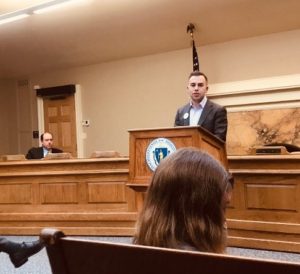This website uses cookies so that we can provide you with the best user experience possible. Cookie information is stored in your browser and performs functions such as recognising you when you return to our website and helping our team to understand which sections of the website you find most interesting and useful.
October 30, 2019
Akamai Offers Public Leadership on Renewables

Akamai’s Mike Mattera and SR Inc’s Jim Boyle Promote Clean Energy at the MA State House
Mike Mattera, Director of Sustainability at Akamai Technologies, Inc. and Jim Boyle, CEO of Sustainability Roundtable, Inc. spoke at a Massachusetts State House briefing on October 28th sponsored by Senator Eldridge and Representative Robinson, co-chairs of the Legislature’s Clean Energy Caucus. The briefing aimed to build support for the 100% Renewable Energy Act – which would transition the state to 100% renewable electricity by 2035 – and Mattera and Boyle focused on how businesses are already embracing renewable energy at scale.

“Massachusetts has the technical, financial and regulatory brains, as well as the private capital and innovation economy, to lead the world to 100% healthy and renewable energy,” said Boyle. “Public officials should look to the example of the world’s fastest growing companies to help make our state the global hub of this technology-based revolution. The move from fuel-based energy to technology-based energy rivals the development of the internet in the breadth and depth of its impact, and the time for Massachusetts to seize top leadership is now.”
Key takeaways from Boyle’s presentation, titled “How Businesses are Going Big on Clean Energy: Why it Makes Sense for the Bottom Line as Well as the Environment” include:
- The IPCC 2018 Special Report on 1.5 C was a “game changer,” clarifying that total future Net Emissions of CO2 must not exceed 360 GT (for reference, 37.1 GT of CO2 were emitted in 2018) to provide a 67% chance of avoiding the most catastrophic effects of climate breakdown including “tipping points” to self-accelerating collapse
- New build utility-scale renewable energy combined with energy storage is increasingly cost competitive with continued use of fully depreciated natural gas plants
- Buyer Organized Aggregated Virtual Power Purchase Agreements (VPPAs) provide purchaser-caused renewable energy certificates (RECs) that are democratizing the cost advantage of utility-scale renewable energy

Mattera’s presentation, titled “Akamai’s Experience with Renewable Energy Procurements” focused on Akamai’s progress as a Massachusetts headquartered company to embrace renewable energy. Akamai is a rapidly growing global content delivery network service that provides edge security, web and mobile performance, and over-the-top media solutions. Despite over a 50% increase in network traffic over the past five years, the company’s energy and carbon usage has grown at only 1/10th of that rate. Renewable energy and network efficiency are the keys to this decoupling of business growth from energy consumption and carbon emissions. Akamai has 2020 goals to reduce GHG emissions below 2015 levels by sourcing renewable energy for 50% of global network operations and to reduce network energy and scope 2 GHG intensity per unit traffic per year by 30%.
To meet these aggressive renewable energy goals, Akamai is participating in innovative green power procurement methods like renewable energy passthroughs and Buyer Organized Aggregated VPPAs. Through partnerships like Renewable Energy Buyers Alliance (REBA), Akamai is working with strategic partners like Iron Mountain to provide data center users with renewable electricity. The company is also building strategic partnerships with other renewable energy buyers and developers with a goal to contract renewable energy in their major metropolitan areas. In 2018, Akamai joined Apple, Etsy and Swiss Re for a smaller portion of a 125-MW wind farms in Illinois and a 165-MW solar farm in Virginia through Buyer Organized Aggregated VPPAs.

Furthermore, Akamai will soon open a new LEED-certified headquarters in Cambridge. “Akamai is committed to reducing its carbon impact, especially in the areas where we work, operate and live,” said Mattera. “The building was designed with energy reduction in mind, and 100% of its carbon footprint is fully mitigated by RECs. Solar panels on the roof of the facility will further reduce our impact on the local Cambridge grid.”
For more information on the State House briefing, view Environment Massachusetts’ press release about the event, and for more information on Akamai’s corporate sustainability leadership, view its sustainability webpage and this previous SR Inc blog post on the subject.

